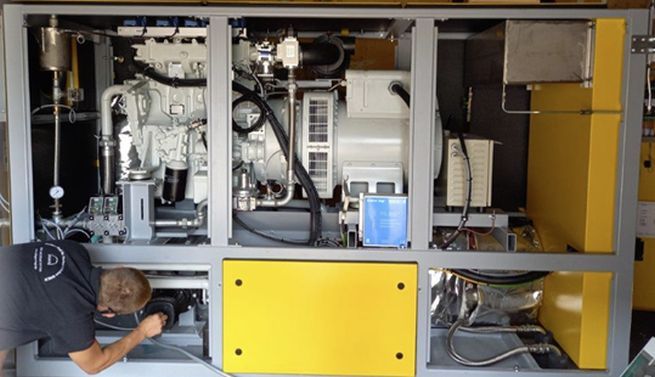More efficient cogeneration plant through integration of a thermochemical recuperator
In a joint research project, MOVE GmbH, Groschopp AG and OWI Science for Fuels gGmbH were able to improve the electrical efficiency of a combined heat and power plant (CHP), thereby improving its economic efficiency. The integration of a thermochemical recuperator (heat-power converter, HPC) into a serially produced MOVE engine was instrumental for the success. The MP-50 model engine has 4 cylinders with an electrical output of 50 kW. As a result of the work, an increase in electrical efficiency of about 4 percent could be measured – which corresponds to a relative increase of about 13 percent. Additionally, a modified motor control concept allows for stable operation without motor knock.
The HPC developed by OWI which was integrated into the engine expands the operating range of the CHP unit, as the power to heat ratio can be adjusted over a wider range via variable recuperation of exhaust heat. The increase in the power to heat ratio allows for a more economical operation of the CHP units. A cost-efficiency comparison with the engine model without a HPC shows that the additional investment is recovered already after just three years. The reason for this is the considerable fuel savings achievable with the technology.
For the purposes of integration into the exhaust system, the HPC was placed as close as possible to the engine in the exhaust manifold. In the HPC, natural gas is mixed with water and converted to hydrogen using heat from the engine exhaust. The syngas produced in this process is fed into the engine as fuel. This syngas is enriched with hydrogen and contains up to 18 percent more chemically bound energy when compared to the same amount of natural gas used. In this process, heat losses are also reduced so that the total amount of thermal energy converted is maximized. This in turn maximizes the savings of natural gas, i.e. the primary fuel utilization.
In the future, engines connected to thermochemical reformers are a suitable option for providing homogeneous fuel gases to the engine intake; even with fluctuating gas concentrations. In addition to fuel savings, this is also expected to have positive effects during maintenance and commissioning. With the help of suitable operational management, adjustments to the gas metering section and engine control can thus be reduced or even be completely avoided.
The Heat-Power-Converter HPC project was supported by grants from the state of North Rhine-Westphalia using funds from the European Regional Development Fund (ERDF) “Investment in Growth and Employment” with the code number ERDF-0801840. The project duration was from 11/2019 to 03/23.






